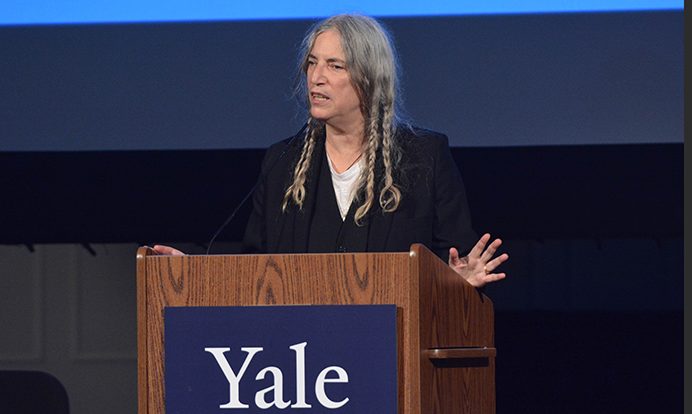Of the hundreds of people that filed into Yale School of Music’s Sprague Memorial Hall last Monday to hear renowned punk singer-songwriter Patti Smith speak, few were Yale undergraduates. Most faces in the audience indeed belonged to the age group whose teenage years were spent with Smith’s legendary punk-rock debut Horses, released in 1975 to widespread critical acclaim and still regarded as one of the defining albums in American rock history.
In fact, it was this album and its hectic, defiant energy that professor of African-American Studies and Theater Studies Daphne Brooks brought up in her introduction of Smith, saying she played and replayed Horses while writing her dissertation.
Smith was on campus to attend the fourth annual Windham-Campbell Prize Festival and give its flagship lecture. Welcomed on stage first by the prize’s program director Mike Kelleher and then by Professor Brooks, Smith walked on the stage to much applause and with trademark rock style in motorcycle boots and jeans.
Joking with a wry smile about recent concerns regarding presidential candidate Hillary Clinton’s health, Smith provided the audience with a “health report” on her bronchial infection to explain her hoarse voice and occasional cough.
Containing some of the same eloquent prose for which her writing is celebrated, Smith’s most beautiful phrases often elicited an approving hum from the audience. Nonetheless, the writer was quick to self-deprecate, pointing out after one of her particularly abstract descriptions received such implicit praise, “That’s the kind of thing your editor goes like, ‘question marks?’”
Though the theme of the festival is “Why I Write,” Smith instead chose to try to explain how she writes, detailing her creative process as an unpredictable but avid process of reading, writing, journaling, traveling, and exploring.
After reading aloud an excerpt from one of her pieces, “Devotion,” Smith guided the audience through her composition of it, from her procrastination in New York to her inspiring journey to and around France, revealing the small experiences that contributed to the evolution of the idea.
She described her admiration for Albert Camus, Simone Weil and Vladimir Nabokov, and the connection she felt to them through the personal objects and spaces they left behind.
One such connection Smith felt in her visit to the Camus family’s private estate, where she was able to touch and read Camus’ final work. To her the experience was “like learning to write all over again.” Taking in Camus’ notes, she described the “call to action” she felt then and which emanates from all great writing.
It is this “call,” Smith said, which motivates her to write, because “I have the hubris to believe I can answer.” Though at the start of her talk she claimed to be without an answer to question of why she writes, by the end of her talk she provided an answer: “Because we cannot simply live.”

